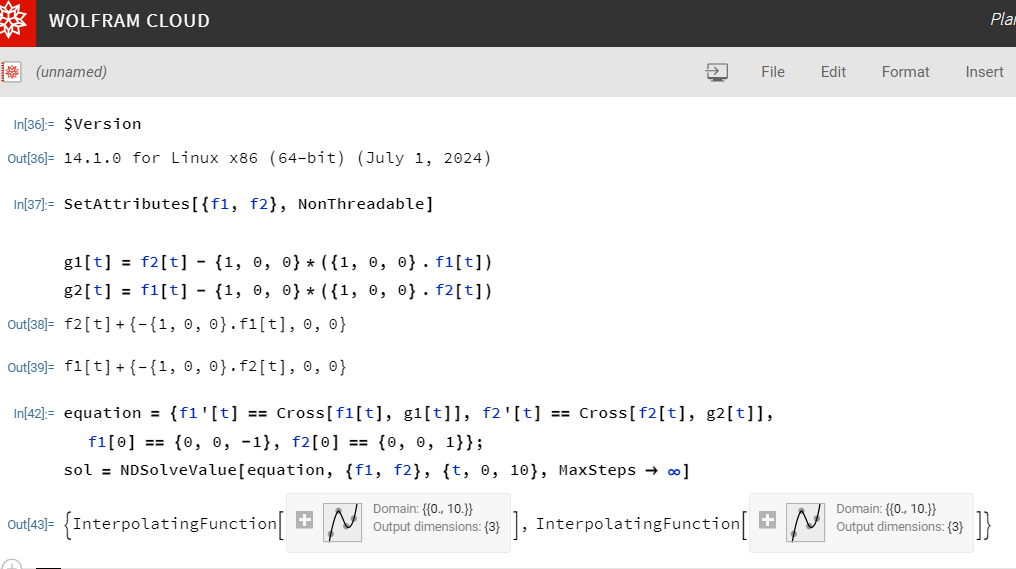This question is similar to an older question but with a system of equations.
I have two equations that I want to solve with NDSolve, and here's a similar minimal example:
$$\frac{d\mathbf{F}_1}{d t}=\left[\mathbf{F}_1 \times \mathbf{G}_1 \right]$$ $$\frac{d\mathbf{F}_2}{d t}=\left[\mathbf{F}_2 \times \mathbf{G}_2 \right]$$
$$\mathbf{G}_1 = \mathbf{F}_2 -\hat{i}(\hat{i}\cdot\mathbf{F}_1)$$ $$\mathbf{G}_2 = \mathbf{F}_1 -\hat{i}(\hat{i}\cdot\mathbf{F}_2)$$
Here, $\mathbf{F}_1$ and $\mathbf{F}_1$ are vectors in Cartesian coordinates, $\mathbf{F}_1=F_{1x}\hat{i}+F_{1y}\hat{j}+F_{1z}\hat{k}$ and $\mathbf{F}_2=F_{2x}\hat{i}+F_{2y}\hat{j}+F_{2z}\hat{k}$.
If we code this directly into Mathematica, if gives an error:
g1[t] = f2[t] - {1, 0, 0}*({1, 0, 0}.f1[t])
g2[t] = f1[t] - {1, 0, 0}*({1, 0, 0}.f2[t])
equation = {f1'[t] == Cross[f1[t],g1[t]] , f2'[t] == Cross[f2[t], g2[t]] , f1[0] == {0, 0, -1}, f2[0] == {0, 0, 1}};
sol = NDSolve[equation, {f1, f2}, {t, 0, 10}, MaxSteps -> \[Infinity]]
Cross:The arguments are expected to be vectors of equal length, and the number of arguments is expected to be 1 less than their length.
Cross:The arguments are expected to be vectors of equal length, and the number of arguments is expected to be 1 less than their length.
NDSolve::ndnum: Encountered non-numerical value for a derivative at t == 0.`.
Perhaps Mathematica is having problems figuring out the dimension of $\mathbf{F}_1$ and $\mathbf{F}_2$? If we remove the last terms with the scalar products,
$$\mathbf{G}_1 = \mathbf{F}_2 $$ $$\mathbf{G}_2 = \mathbf{F}_1 $$
It solves the code without problem:
g1[t] = f2[t]
g2[t] = f1[t]
equation = {f1'[t] == Cross[f1[t],g1[t]] , f2'[t] == Cross[f2[t], g2[t]] , f1[0] == {0, 0, -1}, f2[0] == {0, 0, 1}};
sol = NDSolve[equation, {f1, f2}, {t, 0, 10}, MaxSteps -> \[Infinity]]
{{f1 -> InterpolatingFunction[{{0., 10.}},
So it works fine without the scalar product term in $\mathbf{G}_1$ and $\mathbf{G}_2$.
What gives? What is causing this problem, and what is correct notation? I would rather do it with vectors than to change it into a huge system of 6 equations.

